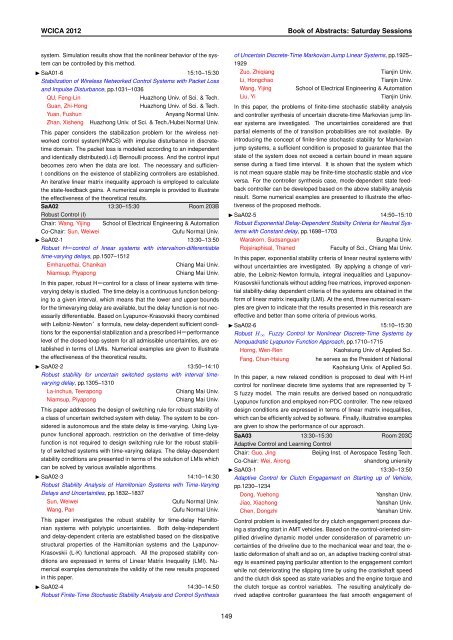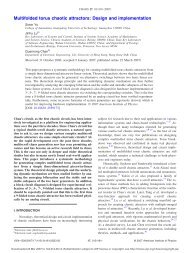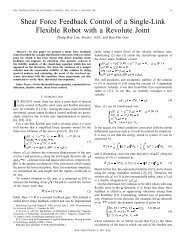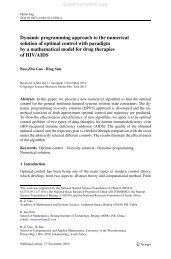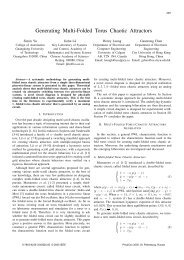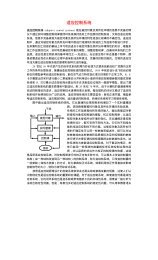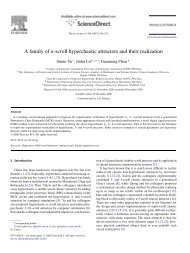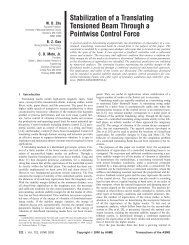Conference Program of WCICA 2012
Conference Program of WCICA 2012
Conference Program of WCICA 2012
Create successful ePaper yourself
Turn your PDF publications into a flip-book with our unique Google optimized e-Paper software.
<strong>WCICA</strong> <strong>2012</strong><br />
Book <strong>of</strong> Abstracts: Saturday Sessions<br />
system. Simulation results show that the nonlinear behavior <strong>of</strong> the system<br />
can be controlled by this method.<br />
◮ SaA01-6 15:10–15:30<br />
Stabilization <strong>of</strong> Wireless Networked Control Systems with Packet Loss<br />
and Impulse Disturbance, pp.1031–1036<br />
QU, Feng-Lin<br />
Huazhong Univ. <strong>of</strong> Sci. & Tech.<br />
Guan, Zhi-Hong<br />
Huazhong Univ. <strong>of</strong> Sci. & Tech.<br />
Yuan, Fushun<br />
Anyang Normal Univ.<br />
Zhan, Xisheng Huazhong Univ. <strong>of</strong> Sci. & Tech./Hubei Normal Univ.<br />
This paper considers the stabilization problem for the wireless networked<br />
control system(WNCS) with impulse disturbance in discretetime<br />
domain. The packet loss is modeled according to an independent<br />
and identically distributed(i.i.d) Bernoulli process. And the control input<br />
becomes zero when the data are lost. The necessary and sufficient<br />
conditions on the existence <strong>of</strong> stabilizing controllers are established.<br />
An iterative linear matrix inequality approach is employed to calculate<br />
the state-feedback gains. A numerical example is provided to illustrate<br />
the effectiveness <strong>of</strong> the theoretical results.<br />
SaA02 13:30–15:30 Room 203B<br />
Robust Control (I)<br />
Chair: Wang, Yijing School <strong>of</strong> Electrical Engineering & Automation<br />
Co-Chair: Sun, Weiwei<br />
Qufu Normal Univ.<br />
◮ SaA02-1 13:30–13:50<br />
Robust H∞control <strong>of</strong> linear systems with intervalnon-differentiable<br />
time-varying delays, pp.1507–1512<br />
Emharuethai, Chanikan<br />
Niamsup, Piyapong<br />
Chiang Mai Univ.<br />
Chiang Mai Univ.<br />
In this paper, robust H∞control for a class <strong>of</strong> linear systems with timevarying<br />
delay is studied. The time delay is a continuous function belonging<br />
to a given interval, which means that the lower and upper bounds<br />
for the timevarying delay are available, but the delay function is not necessarily<br />
differentiable. Based on Lyapunov-Krasovskii theory combined<br />
with Leibniz-Newton’s formula, new delay-dependent sufficient conditions<br />
for the exponential stabilization and a prescribed H∞performance<br />
level <strong>of</strong> the closed-loop system for all admissible uncertainties, are established<br />
in terms <strong>of</strong> LMIs. Numerical examples are given to illustrate<br />
the effectiveness <strong>of</strong> the theoretical results.<br />
◮ SaA02-2 13:50–14:10<br />
Robust stability for uncertain switched systems with interval timevarying<br />
delay, pp.1305–1310<br />
La-inchua, Teerapong<br />
Niamsup, Piyapong<br />
Chiang Mai Univ.<br />
Chiang Mai Univ.<br />
This paper addresses the design <strong>of</strong> switching rule for robust stability <strong>of</strong><br />
a class <strong>of</strong> uncertain switched system with delay. The system to be considered<br />
is autonomous and the state delay is time-varying. Using Lyapunov<br />
functional approach, restriction on the derivative <strong>of</strong> time-delay<br />
function is not required to design switching rule for the robust stability<br />
<strong>of</strong> switched systems with time-varying delays. The delay-dependent<br />
stability conditions are presented in terms <strong>of</strong> the solution <strong>of</strong> LMIs which<br />
can be solved by various available algorithms.<br />
◮ SaA02-3 14:10–14:30<br />
Robust Stability Analysis <strong>of</strong> Hamiltonian Systems with Time-Varying<br />
Delays and Uncertainties, pp.1832–1837<br />
Sun, Weiwei<br />
Wang, Pan<br />
Qufu Normal Univ.<br />
Qufu Normal Univ.<br />
This paper investigates the robust stability for time-delay Hamiltonian<br />
systems with polytypic uncertainties. Both delay-independent<br />
and delay-dependent criteria are established based on the dissipative<br />
structural properties <strong>of</strong> the Hamiltonian systems and the Lyapunov-<br />
Krasovskii (L-K) functional approach. All the proposed stability conditions<br />
are expressed in terms <strong>of</strong> Linear Matrix Inequality (LMI). Numerical<br />
examples demonstrate the validity <strong>of</strong> the new results proposed<br />
in this paper.<br />
◮ SaA02-4 14:30–14:50<br />
Robust Finite-Time Stochastic Stability Analysis and Control Synthesis<br />
<strong>of</strong> Uncertain Discrete-Time Markovian Jump Linear Systems, pp.1925–<br />
1929<br />
Zuo, Zhiqiang<br />
Li, Hongchao<br />
Wang, Yijing<br />
Liu, Yi<br />
Tianjin Univ.<br />
Tianjin Univ.<br />
School <strong>of</strong> Electrical Engineering & Automation<br />
Tianjin Univ.<br />
In this paper, the problems <strong>of</strong> finite-time stochastic stability analysis<br />
and controller synthesis <strong>of</strong> uncertain discrete-time Markovian jump linear<br />
systems are investigated. The uncertainties considered are that<br />
partial elements <strong>of</strong> the <strong>of</strong> transition probabilities are not available. By<br />
introducing the concept <strong>of</strong> finite-time stochastic stability for Markovian<br />
jump systems, a sufficient condition is proposed to guarantee that the<br />
state <strong>of</strong> the system does not exceed a certain bound in mean square<br />
sense during a fixed time interval. It is shown that the system which<br />
is not mean square stable may be finite-time stochastic stable and vice<br />
versa. For the controller synthesis case, mode-dependent state feedback<br />
controller can be developed based on the above stability analysis<br />
result. Some numerical examples are presented to illustrate the effectiveness<br />
<strong>of</strong> the proposed methods.<br />
◮ SaA02-5 14:50–15:10<br />
Robust Exponential Delay-Dependent Stability Criteria for Neutral Systems<br />
with Constant delay, pp.1698–1703<br />
Warakorn, Sudsanguan<br />
Rojsiraphisal, Thaned<br />
Burapha Univ.<br />
Faculty <strong>of</strong> Sci., Chiang Mai Univ.<br />
In this paper, exponential stability criteria <strong>of</strong> linear neutral systems with/<br />
without uncertainties are investigated. By applying a change <strong>of</strong> variable,<br />
the Leibniz-Newton formula, integral inequalities and Lyapunov-<br />
Krasovskii functionals without adding free matrices, improved exponential<br />
stability-delay dependent criteria <strong>of</strong> the systems are obtained in the<br />
form <strong>of</strong> linear matrix inequality (LMI). At the end, three numerical examples<br />
are given to indicate that the results presented in this research are<br />
effective and better than some criteria <strong>of</strong> previous works.<br />
◮ SaA02-6 15:10–15:30<br />
Robust H ∞ Fuzzy Control for Nonlinear Discrete-Time Systems by<br />
Nonquadratic Lyapunov Function Approach, pp.1710–1715<br />
Horng, Wen-Ren<br />
Fang, Chun-Hsiung<br />
Kaohsiung Univ <strong>of</strong> Applied Sci.<br />
he serves as the President <strong>of</strong> National<br />
Kaohsiung Univ. <strong>of</strong> Applied Sci.<br />
In this paper, a new relaxed condition is proposed to deal with H-inf<br />
control for nonlinear discrete time systems that are represented by T-<br />
S fuzzy model. The main results are derived based on nonquadratic<br />
Lyapunov function and employed non-PDC controller. The new relaxed<br />
design conditions are expressed in terms <strong>of</strong> linear matrix inequalities,<br />
which can be efficiently solved by s<strong>of</strong>tware. Finally, illustrative examples<br />
are given to show the performance <strong>of</strong> our approach.<br />
SaA03 13:30–15:30 Room 203C<br />
Adaptive Control and Learning Control<br />
Chair: Guo, Jing<br />
Co-Chair: Wei, Airong<br />
Beijing Inst. <strong>of</strong> Aerospace Testing Tech.<br />
shandong uniersity<br />
◮ SaA03-1 13:30–13:50<br />
Adaptive Control for Clutch Engagement on Starting up <strong>of</strong> Vehicle,<br />
pp.1230–1234<br />
Dong, Yuehong<br />
Jiao, Xiaohong<br />
Chen, Dongzhi<br />
Yanshan Univ.<br />
Yanshan Univ.<br />
Yanshan Univ.<br />
Control problem is investigated for dry clutch engagement process during<br />
a standing start in AMT vehicles. Based on the control-oriented simplified<br />
driveline dynamic model under consideration <strong>of</strong> parametric uncertainties<br />
<strong>of</strong> the driveline due to the mechanical wear and tear, the e-<br />
lastic deformation <strong>of</strong> shaft and so on, an adaptive tracking control strategy<br />
is examined paying particular attention to the engagement comfort<br />
while not deteriorating the slipping time by using the crankshaft speed<br />
and the clutch disk speed as state variables and the engine torque and<br />
the clutch torque as control variables. The resulting analytically derived<br />
adaptive controller guarantees the fast smooth engagement <strong>of</strong><br />
149


